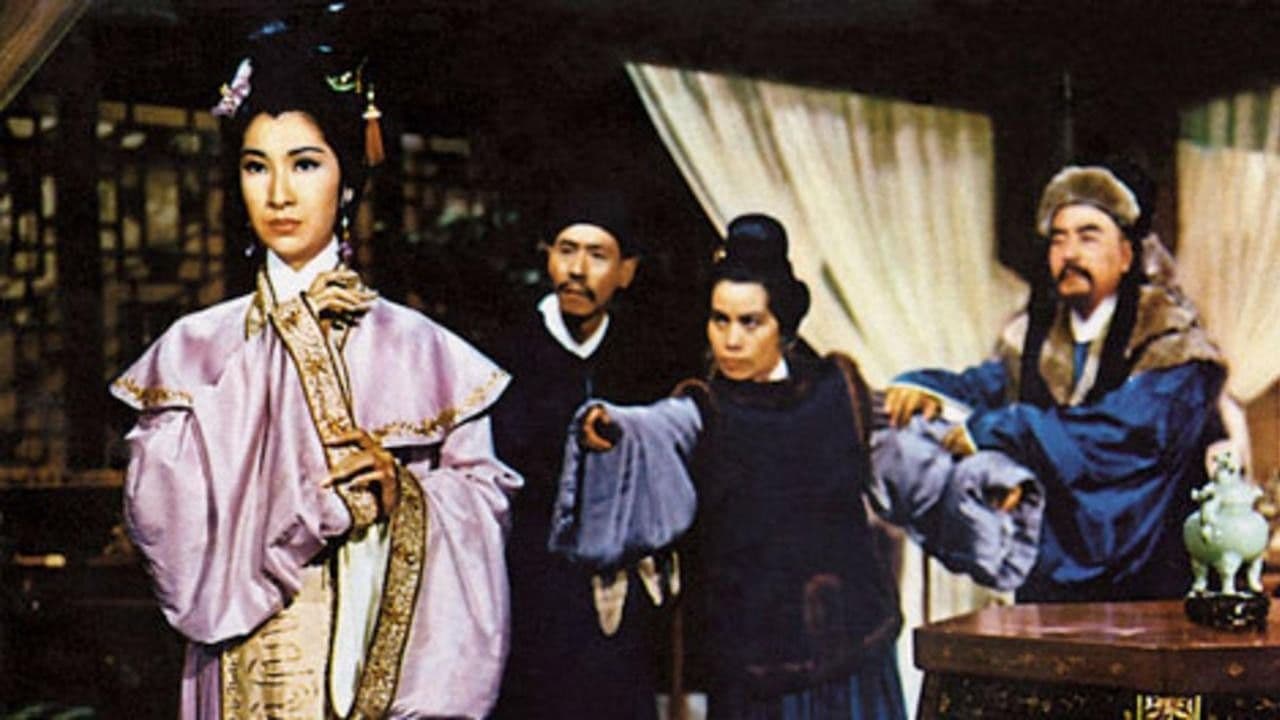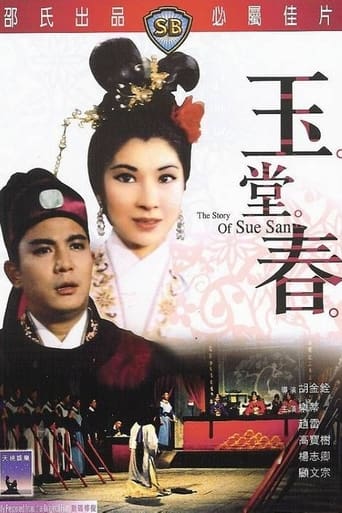

Best movie of this year hands down!
... View Moreeverything you have heard about this movie is true.
... View MoreAn Exercise In Nonsense
... View MoreIt was OK. I don't see why everyone loves it so much. It wasn't very smart or deep or well-directed.
... View MoreTHE STORY OF SUE SAN (1964) tells the story of Wang Jin Long, son of a wealthy government official, and his love for Sue San, a high-class prostitute in a provincial town. Like a lot of early 1960s Hong Kong historical dramas made at Shaw Bros., this falls into the category of Huangmei Opera, which means that much of the dialogue is sung and occasional narration is provided by choral songs on the soundtrack. Sue San is played by Betty Loh Ti, who also starred in ENCHANTING SHADOW (1960), THE DREAM OF THE RED CHAMBER (1962), and LOVE ETERNE (1963), among other musical costume dramas, and Wang is played by Chao Lei, the male lead in many Huangmei operas opposite either Miss Loh or the other major female lead in these films, Linda Lin Dai, including DIAU CHARN (1958), THE KINGDOM AND THE BEAUTY (1959), THE ENCHANTING SHADOW (1960), and MADAME WHITE SNAKE (1962). In this film, Wang basically sacrifices everything to marry Sue San and pay the brothel enough money to free her from seeing other customers, going so far as to build a mansion for the two of them on an adjacent lot. When the money runs out, he falls into destitution and Sue San has to go back to entertaining other high-profile customers. Changes in fortune continue on both sides, culminating in a life-or-death court case that finds the two facing each other from opposite sides of the Imperial Chinese justice system.The songs are lovely, the music melodious and the elaborate sets and costumes beautiful to look at for 107 minutes. There is a charming scene early on where Wang throws a dinner party and invites Sue San so he can get to know her better and atone for being rude to her at the brothel the night before after she'd kept him waiting all night. During the dinner, guests pick up a cup and sing improvised verses before passing the cup to the next guest to continue the song. I recognized part of the song from the subtitles as the story of the legend of the white snake (immortalized in numerous films, including the aforementioned MADAME WHITE SNAKE), but when Wang and Sue San sing their verses, the subject switches to the events of the night before, leaving poor Wang humiliated and embarrassed (as well he should be). The course of true love is long and difficult in this film and leads to much suffering for the two, especially Sue San who is eventually sold off to one of her high-ranking customers, Master Shen (Yang Chi-ching), and is forced to work as a maid under the angry, watchful eye of Madame Shen (Kao Pao Shu), who crafts a murderous plot that results in death by poisoning, false accusations, and a death sentence. Things look bad for Sue San until a newly appointed inspector arrives and opts to re-open the case.I enjoyed the film but it takes way too long to get where it's going. At 107 minutes, it could have been at least 15 minutes shorter. At one point, Sue San sings her life story in court, rehashing numerous events we'd either seen or heard about already. I kept waiting for her to get to the specifics of her defense. While Betty Loh Ti is quite beautiful and gives her usual polished, sincere performance, I was less pleased with Chao Lei, who is much better when playing young, naïve scholars, as in ENCHANTING SHADOW and MADAME WHITE SNAKE. Granted, it's not the actor who's at fault here, but the character. Wang is a weak and pitiable man, a pampered heir who loses control of his situation too easily. (Chao played this type of character often as well, including in Cathay's A STORY OF THREE LOVES, 1964.) I felt sympathy for Wang at times, but later, at a crucial moment for Sue San, he displays a moment of hesitation that I found absolutely contemptible. Sue San deserved someone much more forthright, courageous and self-assured. Ms. Loh was better served when her leading "man" was actress Ivy Ling Po, who played the male scholar in LOVE ETERNE and proved much more manly than Chao Lei.The film is credited to director King Hu, best known for his swordplay epics, COME DRINK WITH ME (1965), DRAGON INN (1967), and A TOUCH OF ZEN (1971). This film is unlike any other film of his that I've seen. According to the special features on the R3 Celestial DVD, the film was co-directed by Li Han-hsiang, which makes perfect sense, since he directed four of the other films I've cited in this review and this film is much more similar to those films than to King Hu's martial arts adventures.
... View More